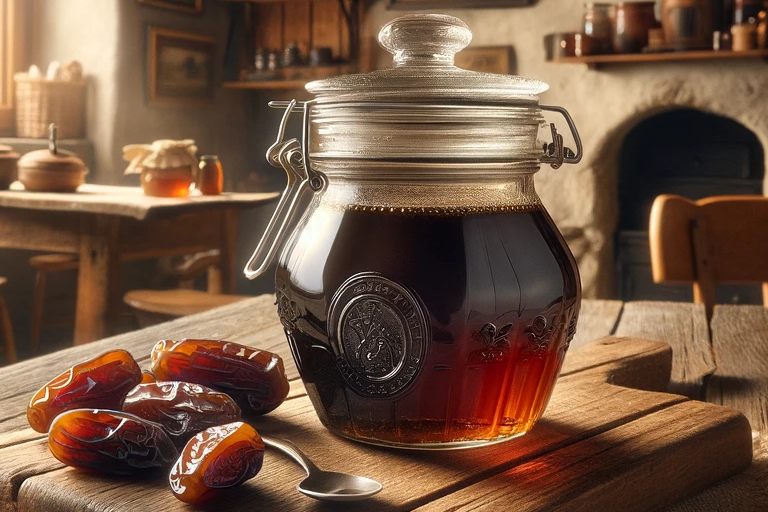Molasses

Molasses is a dark, viscous syrup that is produced during sugar production from sugar cane or sugar beet. It still contains many minerals, vitamins and trace elements that are missing in refined sugar. Molasses is often used as a sweetener or flavor enhancer in food, but also as a dietary supplement for humans and animals.
The benefits of molasses for dogs
Molasses can have some health benefits for dogs when fed in moderation. For example, molasses can
- aid digestion, as it contains fiber and prebiotic substances that support the growth of good bacteria in the gut
- stimulate blood formation, as it provides iron, copper and folic acid, which are important for the formation of red blood cells
- strengthen the immune system as it contains vitamin C, B vitamins and antioxidants that protect against free radicals
- improve skin and coat health as it contains zinc, manganese and biotin, which are important for cell division and hair growth
- support nerve function as it contains magnesium, potassium and vitamin B6, which are important for the transmission of nerve impulses
The disadvantages of molasses for dogs
However, molasses is not only good for dogs. It also has some disadvantages that you should be aware of. For example, molasses can
- lead to obesity, as it is very high in calories and can increase blood sugar levels
- lead to tooth decay as it is sticky and sticks to the teeth
- lead to diarrhea if it is fed in excessive quantities or if the dog is sensitive to it
- lead to allergic reactions if the dog has an intolerance or allergy to molasses or one of the substances it contains
How do you feed molasses to dogs?
If you want to feed your dog molasses, there are a few things you should bear in mind:
- Choose a high-quality organic molasses that does not contain additives such as sulphur or preservatives
- Only feed small amounts of molasses as a treat or as an addition to food. A rule of thumb is one teaspoon per 10 kilograms of body weight per day
- Monitor your dog for possible side effects such as diarrhea, vomiting or itching. If these occur, you should stop the molasses immediately and consult a vet
- Brush your dog's teeth regularly or give him chewables to prevent tooth decay
- Ask your vet for advice before feeding your dog molasses, especially if he has health problems such as diabetes or anemia
Molasses is a natural syrup that contains many nutrients and can be healthy for dogs. However, molasses should only be fed in small quantities and attention should be paid to possible disadvantages.
If you notice any signs of hypersensitivity or poisoning in your dog, you should see your vet immediately. We are not a substitute for a vet, but we try to be as accurate as possible. Every dog reacts differently and we recommend you get a second opinion or consult your vet if in doubt.
Stay healthy and take good care of your four-legged friend!😊
Similar to Molasses
What is maple syrup? Maple syrup is a natural sweetener obtained from the sap of the maple tree. This sap is collected and then concentrated by heating, creating the characteristic golden syrup. It...
Honey is a natural product made by bees from the nectar of flowers or the honeydew of plants. The bees collect the nectar or honeydew, carry it in their honey stomachs to the beehive and pass it on...
Agave syrup, also known as agave syrup, is made from the juice of the agave plant, which is mainly native to Mexico. This sap is filtered and heated to obtain a concentrated syrup that is rich in...
Date syrup, also known as date honey, is a natural sweetener obtained by boiling dates in water. The result is a thick, rich syrup that contains the sweetness and nutrients of dates in a...



